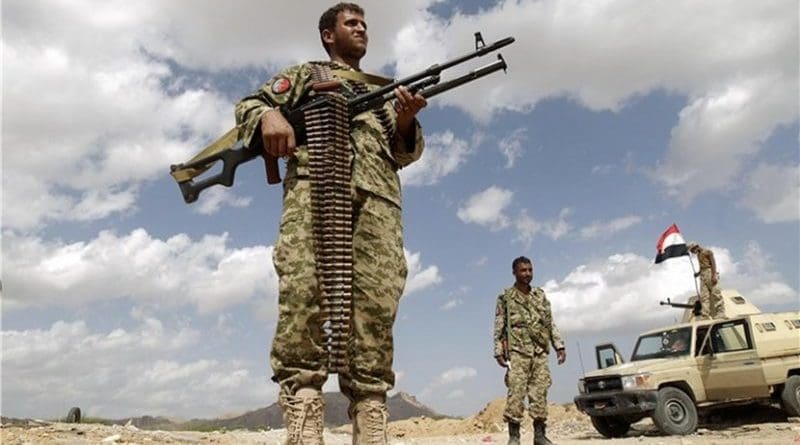Time For International Community To Get Tough On Houthis – OpEd
By Arab News
By Dr. Hamdan Al-Shehri*
Houthi terrorist attacks continue to target international shipping lanes and commercial ships, as well as civilian airports and residential areas. Another attack took place on Monday, when a mined boat caused an explosion on board an oil tanker off the Saudi port of Jeddah. With this latest attack on the Saudi energy sector, the Houthi militia intensified its terrorist acts, with Iranian support and planning, on the Kingdom’s land, seas and oil installations.
These attacks confirm Iran’s insistence on destabilizing the security and stability of the region, as it is the real actor responsible. The attacks follow its hostile policy in the region and the spread of its terrorist revolution and its malicious ideology. However, the responsibility today also goes beyond Iran and now includes the international community that turns a blind eye to Tehran’s terrorism and its support for terrorist militias that occupy four Arab capitals.
These militias carry weapons outside the framework of the state, as can be seen in Lebanon and Iraq, while in Yemen the Houthis have gone even further, as they carried out a coup against the legitimate government. Tehran also poses an intercontinental threat. It has several projects that threaten global security and stability, including using its militias, which carry advanced weapons from Tehran such as drones and ballistic missiles. They have targeted the Kingdom’s lands hundreds of times, with each attack met by terrible international silence.
It is as if the international community does not know that the Houthis carried out a coup or what they are doing in terms of killing, kidnapping, arresting, and starving the Yemenis, while stealing their international aid. This was preceded by them sending citizens to fight, even children, including those they kidnapped from the school benches to use as fuel for the sectarian war Tehran has ignited in the region.
Iran has many dangerous programs and the terrorist militia file is one of them. It also has its dangerous ballistic missile program, which President Hassan Rouhani this week mentioned. He declared that the ballistic missile program — along with Iran’s regional expansionism through its militias — would not be on the table in any future negotiations with the US.
Its nuclear file is the other big problem in terms of Iran’s threat to the region and the world, especially in the light of international impotence and failure to close this file. The 2015 nuclear deal, which was agreed between Tehran and the P5+1 group of countries, was flawed as it did not take into account the regime in Tehran. The deal only aimed to delay Iran’s access to nuclear weapons capability. It did not take into account the opinions of Tehran’s neighbors and it did not cover Iran’s other files, such as its militias and its ballistic missile program.
International inaction has encouraged Tehran to continue its terrorist projects, which threaten international navigation, the energy sector and the wider global economy, as well as destabilizing security and stability that may lead the region into the abyss if it is not confronted.
Tehran has been given many opportunities, but every time it only increases its terrorism and the training and financing of its militias, as well as continuing to target the interests of major countries and their embassies, as has happened in Iraq. The world will remain in a state of chaos in light of the failure to dismantle the terrorist militias of the Islamic Revolutionary Guard Corps, which is classified as a terrorist organization by the US. The Houthis are just one of the militias Tehran uses and even heavily relies on to carry out its terrorist acts.
Unfortunately, despite all this Houthi terrorism, their kidnapping of the state, and the killing and starvation of the Yemeni people, the world is still refusing to include this militia on their terrorist lists. Rather, the Houthis are called for negotiations, the outcomes of which the militia does not implement. These talks allow the Houthis to procrastinate, gain time, and increase their crimes.
If the international community, including the UN Security Council (UNSC), does not prevent this Houthi terrorism and Iran’s regional meddling, then it must not object to the role of the Arab coalition in liberating the lands of Yemen from the Houthis’ terrorist occupation. The international community should also stop the dishonest marketing of political negotiations with the Houthis because UNSC resolution 2216, which demands the Houthis hand over their heavy weaponry and withdraw from the cities they occupy before entering into negotiations if they want a political solution, remains in place. This resolution passed five years ago and still the Houthis have not implemented a single clause. This is not because the Houthis are strong, but rather is because the international community gives them opportunities, protects them and does not want to purify Yemen of this dreaded militia.
*Dr. Hamdan Al-Shehri is a political analyst and international relations scholar. Twitter: @drhamsher7

